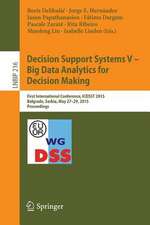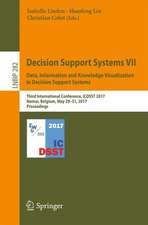Real-World Decision Support Systems: Case Studies: Integrated Series in Information Systems, cartea 37
Editat de Jason Papathanasiou, Nikolaos Ploskas, Isabelle Lindenen Limba Engleză Paperback – 7 iul 2018
It complements the many works that focus on theoretical aspects or individual module design and development by offering ‘good’ and ‘bad’ practices when developing and using decision support systems. Combining high-quality research with real-world implementations, it is of interest to researchers and professionals in industry alike.
| Toate formatele și edițiile | Preț | Express |
|---|---|---|
| Paperback (1) | 647.93 lei 6-8 săpt. | |
| Springer International Publishing – 7 iul 2018 | 647.93 lei 6-8 săpt. | |
| Hardback (1) | 654.37 lei 6-8 săpt. | |
| Springer International Publishing – 28 dec 2016 | 654.37 lei 6-8 săpt. |
Din seria Integrated Series in Information Systems
- 15%
 Preț: 646.62 lei
Preț: 646.62 lei - 20%
 Preț: 996.07 lei
Preț: 996.07 lei - 20%
 Preț: 1272.94 lei
Preț: 1272.94 lei -
 Preț: 389.11 lei
Preț: 389.11 lei - 20%
 Preț: 998.04 lei
Preț: 998.04 lei - 15%
 Preț: 654.43 lei
Preț: 654.43 lei - 20%
 Preț: 1933.71 lei
Preț: 1933.71 lei -
 Preț: 388.52 lei
Preț: 388.52 lei - 15%
 Preț: 646.11 lei
Preț: 646.11 lei - 15%
 Preț: 667.71 lei
Preț: 667.71 lei - 15%
 Preț: 711.89 lei
Preț: 711.89 lei -
 Preț: 393.52 lei
Preț: 393.52 lei - 15%
 Preț: 644.82 lei
Preț: 644.82 lei - 18%
 Preț: 955.25 lei
Preț: 955.25 lei - 5%
 Preț: 1280.25 lei
Preț: 1280.25 lei - 15%
 Preț: 580.97 lei
Preț: 580.97 lei - 15%
 Preț: 638.11 lei
Preț: 638.11 lei - 20%
 Preț: 1277.24 lei
Preț: 1277.24 lei - 20%
 Preț: 1215.14 lei
Preț: 1215.14 lei - 20%
 Preț: 638.37 lei
Preț: 638.37 lei - 5%
 Preț: 1801.57 lei
Preț: 1801.57 lei - 18%
 Preț: 952.72 lei
Preț: 952.72 lei - 15%
 Preț: 653.14 lei
Preț: 653.14 lei - 20%
 Preț: 995.75 lei
Preț: 995.75 lei - 20%
 Preț: 649.28 lei
Preț: 649.28 lei
Preț: 647.93 lei
Preț vechi: 809.92 lei
-20% Nou
Puncte Express: 972
Preț estimativ în valută:
124.02€ • 134.76$ • 104.24£
124.02€ • 134.76$ • 104.24£
Carte tipărită la comandă
Livrare economică 21 aprilie-05 mai
Preluare comenzi: 021 569.72.76
Specificații
ISBN-13: 9783319829425
ISBN-10: 3319829424
Ilustrații: XX, 327 p. 117 illus., 82 illus. in color.
Dimensiuni: 155 x 235 mm
Greutate: 0.49 kg
Ediția:Softcover reprint of the original 1st ed. 2016
Editura: Springer International Publishing
Colecția Springer
Seria Integrated Series in Information Systems
Locul publicării:Cham, Switzerland
ISBN-10: 3319829424
Ilustrații: XX, 327 p. 117 illus., 82 illus. in color.
Dimensiuni: 155 x 235 mm
Greutate: 0.49 kg
Ediția:Softcover reprint of the original 1st ed. 2016
Editura: Springer International Publishing
Colecția Springer
Seria Integrated Series in Information Systems
Locul publicării:Cham, Switzerland
Cuprins
Computerized decision support case study research: concepts and suggestions.- ArgMed: a support system for medical decision making based on the analysis of clinical discussions.- The integration of decision analysis techniques in high-throughput clinical analyzers.- Decision support systems for energy production optimization and network design in district heating applications.- Birth and evolution of a decision support system in the textile manufacturing field.- A decision analytical perspective on public procurement processes.- Evaluation support system for open challenges on earth observation topics.- An optimization based decision support system for strategic planning in process industries: the case of a pharmaceutical company.- Decision support in water resources planning and management: the Nile Basin decision support system.- The AFM-ToolBox to support adaptive forest management under climate change.- SINGRAR – a distributed expert system for emergency management. Context anddesign.- SINGRAR – a distributed expert system for emergency management. Implementation and validation.- Crop Protection Online -Weeds: a case study for agricultural decision support systems.
Notă biografică
Jason Papathanasiou is an Assistant Professor at the Department of Business Administration, University of Macedonia, Greece. His PhD was in Operational Research and Informatics and he has worked for a number of years at various institutes. He has organized and participated in many international scientific conferences and workshops. He has published more than 100 papers in international peer referred journals, conferences and edited volumes and has participated in various research projects in FP6, FP7, Interreg and COST; he served also as a member of the TDP Panel of COST and currently serves at the coordination board of the EURO Working Group of Decision Support Systems. His research interests include Decision Support Systems, Operational Research and Multicriteria Decision Making.
Nikolaos Ploskas is a Postdoctoral Researcher at the Department of Chemical Engineering, Carnegie Mellon University, USA. His primary research interests are in operations research, decision support systems, mathematical programming, linear programming, and parallel programming. He has participated in several international and national research projects. He is author of more than 40 publications in high-impact journals, book chapters and conferences. He has also served as reviewer in many scientific journals. He was awarded with an honorary award from HELORS (HELlenic Operations Research Society) for the best doctoral dissertation in operations research (2014).
Isabelle Linden is a Professor of Information Management at the University of Namur in Belgium, Department of Business Administration. She obtained her PhD in Computer Sciences from the University of Namur. She also holds Masters degrees in Philosophy and in Mathematics from the University of Liege, Belgium. She is member of the CoordiNam Laboratory and the FoCuS Research Group. Combining theoretical computer science and business administration, her main research domain regards information,knowledge and artificial intelligence. She explores their integration within systems as EIS, DSS and BI systems. Her works can be found in several international edited books, journals, books chapters and conferences. She serves as reviewer and program committee member in several international journals, conferences and workshops.
Nikolaos Ploskas is a Postdoctoral Researcher at the Department of Chemical Engineering, Carnegie Mellon University, USA. His primary research interests are in operations research, decision support systems, mathematical programming, linear programming, and parallel programming. He has participated in several international and national research projects. He is author of more than 40 publications in high-impact journals, book chapters and conferences. He has also served as reviewer in many scientific journals. He was awarded with an honorary award from HELORS (HELlenic Operations Research Society) for the best doctoral dissertation in operations research (2014).
Isabelle Linden is a Professor of Information Management at the University of Namur in Belgium, Department of Business Administration. She obtained her PhD in Computer Sciences from the University of Namur. She also holds Masters degrees in Philosophy and in Mathematics from the University of Liege, Belgium. She is member of the CoordiNam Laboratory and the FoCuS Research Group. Combining theoretical computer science and business administration, her main research domain regards information,knowledge and artificial intelligence. She explores their integration within systems as EIS, DSS and BI systems. Her works can be found in several international edited books, journals, books chapters and conferences. She serves as reviewer and program committee member in several international journals, conferences and workshops.
Textul de pe ultima copertă
This book presents real-world decision support systems, i.e., systems that have been running for some time and as such have been tested in real environments and complex situations; the cases are from various application domains and highlight the best practices in each stage of the system’s life cycle, from the initial requirements analysis and design phases to the final stages of the project. Each chapter provides decision-makers with recommendations and insights into lessons learned so that failures can be avoided and successes repeated. For this reason unsuccessful cases, which at some point of their life cycle were deemed as failures for one reason or another, are also included. All decision support systems are presented in a constructive, coherent and deductive manner to enhance the learning effect.
It complements the many works that focus on theoretical aspects or individual module design and development by offering ‘good’ and ‘bad’ practices when developing and using decision support systems. Combining high-quality research with real-world implementations, it is of interest to researchers and professionals in industry alike.
It complements the many works that focus on theoretical aspects or individual module design and development by offering ‘good’ and ‘bad’ practices when developing and using decision support systems. Combining high-quality research with real-world implementations, it is of interest to researchers and professionals in industry alike.
“A book on real case studies in Decision Support Systems is a much-needed publication in an area where most literature has been dedicated to theory, underestimating the empirical dimension of decision-making support. I am very glad to see this book appearing. It really fills a gap”.
Professor Alexis Tsoukiàs, Director of LAMSADE, CNRS - LAMSADE, Université Paris Dauphine, France.
“This book is informative, interesting, and inter-disciplinary. It exemplifies how Decision Support Systems can transform, influence, and impact real-world practices”.
Professor Shaofeng Liu, Plymouth Graduate School of Management & Plymouth Business School, Plymouth University, UK.
“A very attractive book that undoubtedly augments our understanding of Decision Support Systems and their myriad of applications. I would like to offer my congratulations to the authors and recommend the book to all potential readers".
Professor José María Moreno-Jimenez, Faculty of Economics and Business, University of Zaragoza, Spain, and President of the International Association of Applied Economics Asepelt.
Caracteristici
Highlights best practices in each stage of a decision support system’s life cycle, from the initial requirements analysis and design phases to the final stages of the project Presents both successful and unsuccessful decision support systems so that failures can be avoided and success repeated All decision support systems are described in a constructive, coherent and deductive manner for maximum benefit Includes supplementary material: sn.pub/extras




















